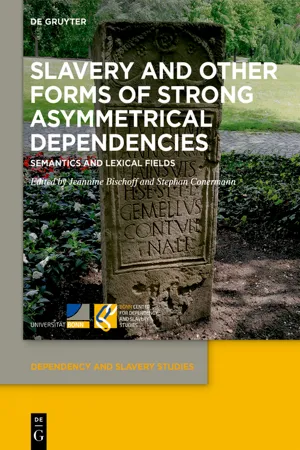
Slavery and Other Forms of Strong Asymmetrical Dependencies
Semantics and Lexical Fields
- 262 pages
- English
- ePUB (mobile friendly)
- Available on iOS & Android
Slavery and Other Forms of Strong Asymmetrical Dependencies
Semantics and Lexical Fields
About This Book
In this volume, we approach the phenomenon of slavery and other types of strong asymmetrical dependencies from two methodologically and theoretically distinct perspectives: semantics and lexical fields.
Detailed analyses of key terms that are associated with the conceptualization of strong asymmetrical dependencies promise to provide new insights into the self-concept and knowledge of pre-modern societies. The majority of these key terms have not been studied from a semantic or terminological perspective so far.
Our understanding of lexical fields is based on an onomasiological approach – which linguistic items are used to refer to a concept? Which words are used to express a concept? This means that the concept is a semantic unit which is not directly accessible but may be manifested in different ways on the linguistic level. We are interested in single concepts such as 'wisdom' or 'fear', but also in more complex semantic units like 'strong asymmetrical dependencies'.
In our volume, we bring together and compare case studies from very different social orders and normative perspectives. Our examples range from Ancient China and Egypt over Greek and Maya societies to Early Modern Russia, the Ottoman Empire and Islamic and Roman law.
Frequently asked questions
Information
Table of contents
- Title Page
- Copyright
- Contents
- Introduction: The Semantics of Slavery and Other Forms of Strong Asymmetrical Dependency in Comparison
- Indefinite Terms? Social Groups in Early Ancient China (ca. 1300–771 BC) and “Strong Asymmetrical Dependency”
- Tax Coercion as a Real and Metaphorical YOKE: On the Earliest State Administrative Practices Reflected in Ancient Egyptian Writing and Images Around 3000 BC
- Dependent Rural Populations in Archaic and Classical Greece: Free, Slave, or Between Free and Slave?
- Familia and Dependency in Roman Law Texts
- Visualizations and Expressions of Dependencies in Classic Maya Narratives: A Semiotic Approach
- How to Approach Emic Semantics of Dependency in Islamic Legal Texts: Reflections on the Ḥanafī Legal Commentary al-Hidāya fī sharḥ bidāya al-mubtadī and its British-Colonial Translation
- Modes of Manumission: What Terms Used for Emancipation Tell Us about Dependencies in Ottoman Society
- Terms for Dependent People in Rural Russia in Early Modern Records
- Index